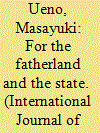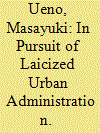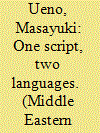|
|
|
Sort Order |
|
|
|
Items / Page
|
|
|
|
|
|
|
| Srl | Item |
| 1 |
ID:
120069


|
|
|
|
|
| Publication |
2013.
|
| Summary/Abstract |
This article examines Ottoman Armenian attitudes toward the Tanzimat reforms, particularly in relation to the situation of provincial Armenians. Even though implementation of the reforms was slow and marked by setbacks, the promises embedded in them raised expectations of change among Armenians in both Istanbul and the provinces. In response, individuals in these areas equipped themselves with knowledge of the language and principles of the Tanzimat. They interpreted and utilized these for their own purposes, sometimes not as the Ottoman government intended. In this sense, the Tanzimat was not merely a top-down state project; it was also pluralized through interactions between the government and its subjects. Exploring how non-Muslims negotiated the Tanzimat enables reconsiderations of the Muslim-elite-centered historiography on the reforms.
|
|
|
|
|
|
|
|
|
|
|
|
|
|
|
|
| 2 |
ID:
186579


|
|
|
|
|
| Summary/Abstract |
The Ottoman Empire introduced the muhtar system in Istanbul in 1829, appointing lay headmen, called muhtar, to the lowest levels of urban administration: Muslim neighborhoods; Orthodox, Armenian, and Catholic parishes; and Jewish congregations. This reform resulted in the overlapping of state responsibilities and those of non-Muslim religious authorities, later leading to disputes between the groups. This article investigates such disagreements in an effort to understand how state officials perceived non-Muslim religious authorities’ participation in imperial governance. In so doing, this article argues that, as non-Muslim political movements began developing during the late nineteenth century, state officials adopted a cautious attitude toward non-Muslim clergy, viewing the latter as requiring more careful handling than the layman. This take on clergymen was a shift, a reconsideration of the exceptional treatment they had previously enjoyed, and ignited a growing desire to sever the ties, formerly tolerated, between muhtars and religious authorities.
|
|
|
|
|
|
|
|
|
|
|
|
|
|
|
|
| 3 |
ID:
146797


|
|
|
|
|
| Summary/Abstract |
This article focuses on the publications of Garabed Panosian and examines the extent of readership achieved by the Armeno-Turkish newspapers in the nineteenth-century Ottoman Empire. It specifically focuses on the linguistic, social, and political circumstances in which his newspapers were read. The readership of Panosian's newspapers was not only limited to Turkish monolingual Armenians but also extended to Armenian--Turkish bilingual Armenians. Moreover, his newspapers, along with other Armeno-Turkish materials, gained a non-Armenian readership. Thus, Panosian was able to use his newspapers to display the allegiance of Armenians to the Ottoman Empire, aiming at a favourable evaluation from government circles. Besides being a tool to reach out to Turkish monolinguals, Armeno-Turkish newspapers were also rich products of the culture of bilingualism and a medium shared by religiously diverse people. Thus, examining Armeno-Turkish materials elucidates the pluralistic society of the late Ottoman Empire.
|
|
|
|
|
|
|
|
|
|
|
|
|
|
|
|
|
|
|
|
|